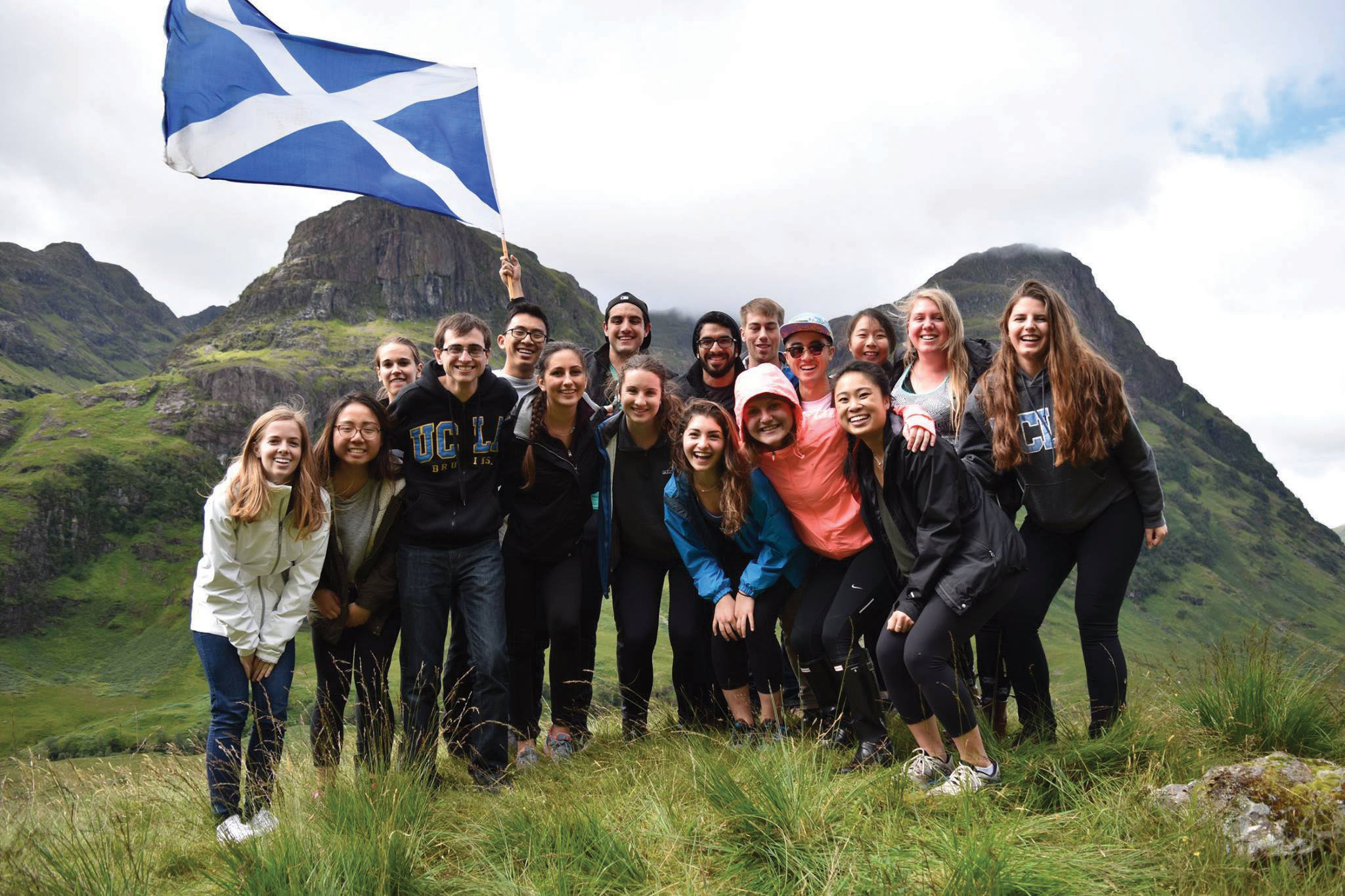Early graduation within reach for most bruins

Students on a study abroad program in Scotland. Photo Credit: Michael Le
To her surprise, Qiyuan (Grace) Miao realized during her sophomore year that she could graduate a year early, allowing her to begin graduate school ahead of schedule.
Miao is one of many Bruins who choose to complete their undergraduate degrees in less than the traditional four years. Although on different academic paths, these students all share a common message: With good planning and by taking advantage of UCLA programs designed to reduce time to degree, almost anyone can graduate early.
Miao, who graduated in June, pointed to several opportunities at UCLA that enabled her to get ahead on her coursework and finish her communication degree in three years while still enjoying a full undergraduate experience.
Opportunities start freshman year
UCLA offers two intensive programs to introduce incoming students to campus and academic life: the Freshman Transfer Summer Program in the Academic Advancement Program, for students from underrepresented populations, and the College Summer Institute (CSI). Students in both programs take courses that fulfill graduation requirements, giving them a head start before their first fall quarter even begins.
CSI is where Miao first met with Brian Henry, an academic adviser who helped her map out her academic path — something all undergraduates are encouraged to do at least once a year. In advising sessions, students discuss their academic, personal and career goals and learn about opportunities to enrich their university experience. Academic counselors can also advise students on effective ways to maximize their time to degree if their goal is to graduate early.
Another way Miao optimized her time at UCLA was by taking a Freshman Cluster course, “Frontiers of Aging.” These are year-long general education courses offered on topics such as “Evolution of the Cosmos and Life” and “History of Modern Thought.” Each cluster, over the course of a year, satisfies four general education requirements and the Writing II requirement.
“Clusters are a great way to fulfill a lot of requirements very quickly,” Miao said.
UC’s study-abroad intensives
Graduating early doesn’t require students to sacrifice meaningful experiences outside of the classroom. Michael Le, who graduated with a bachelor’s degree in neuroscience in winter 2019, one quarter early, was still able to study abroad one summer at the University of Glasgow, where UC offers an intensive three-course physics program over two months.
“I completed all three courses in a mere eight weeks, something that would [normally] take 30 weeks,” Le said. “This is an excellent way to get your study abroad ‘fix’ in and be efficient with course planning.”
Shrey Kakkar, a junior majoring in computer science, is on track to graduate one or two quarters early and said many of his peers could do the same, even in a demanding major like computer science. He credits his fast track to his commitment to enroll in four classes every quarter, plus one summer class. And he still has had time for other activities such as doing research and working for a startup.
Fitting more into four years
Graduating early isn’t every student’s goal. For some, like Mac Casey, maximizing time to degree meant packing a lot into the traditional four years: He was in the rigorous College Honors program, studied abroad for a year, and graduated in 2016 with degrees in both political science and business economics.
“The faculty at UCLA are excellent, and I loved taking courses – the more courses the better,” Casey said. “I really wanted to learn as much as I could and interact with great faculty and researchers.”
Casey said that accomplishing so much in four years is not out of reach for most students. By choosing courses strategically and enlisting the expertise of his honors academic counselor, he was able to complete all his major requirements and stay on track.
Dean and Vice Provost of Undergraduate Education Patricia Turner said that although UCLA already does an excellent job of graduating students in a timely manner, she will continue to work with her faculty colleagues to develop new opportunities to allow students to graduate on time or early while still having a personalized, fully engaged undergraduate experience.
“A student’s undergraduate years are the perfect time to discover what they’re most passionate about,” Turner said. “Students who take advantage of credit-earning opportunities such as service learning, civic engagement and entrepreneurship often find themselves on career paths they otherwise might not have discovered. And because of the way these programs are designed, students can still graduate in four years or less.”



